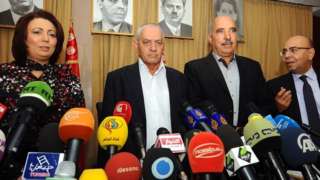The Nobel Peace Prize has been awarded to Tunisia’s National Dialogue Quartet for helping the country’s transition to democracy.
The Nobel committee said the group of civil society organisations had made a “decisive contribution” to democracy after the 2011 revolution.
It said the quartet helped establish a political process when the country “was on the brink of civil war”.
Tunisia’s uprising was the first and most successful of the Arab Spring.
Media captionChairman of the Norwegian Nobel Committee Kaci Kullmann Five makes the announcement
While other countries – Libya, Egypt, Yemen and Syria – either reverted to authoritarian rule or descended into violence and chaos, Tunisia managed a successful transition to democracy.
The surprise winner of this year’s Nobel Peace Prize has played a key role in mediating between the different parties in the country’s post-Arab Spring government.
The Quartet is credited with creating a national dialogue between the country’s Islamist and secular coalition parties amid deepening political and economic crisis in 2013.
Tunisia’s revolution – also known as the Jasmine Revolution – began in late 2010 and led to the ousting of President Zine El Abidine Ben Ali in January 2011, followed by the country’s first free democratic elections last year.
Kaci Kullman Five, the chair of the Nobel peace committee, said the Quartet’s role in Tunisia’s democratisation was “directly comparable to the peace conferences mentioned by Alfred Nobel in his will”.
Houcine Abassi, head of Tunisia’s General Labour Union – one of the groups in the quartet – said the award was a “tribute to martyrs of a democratic Tunisia”.
“This effort by our youth has allowed the country to turn the page on dictatorship,” he said.
Abdessattar Ben Moussa of the Human Rights League – another of the quartet – said the award “fills us with joy” at a time when Tunisia “is going through a period marked by political tensions and terrorist threats”.
He told the Associated Press he hoped it would encourage the winners to take a “larger responsibility” in solving Tunisia’s problems.
Tunisia’s President Beji Caid Essebsi, said the award recognised the country’s decision to choose the “path of consensus”.
“Tunisia has no other solution than dialogue despite ideological disagreements,” he said in a video posted to his Facebook page.
The quartet is made up of four organisations: the Tunisian General Labour Union, the Tunisian Confederation of Industry, Trade and Handicrafts, the Tunisian Human Rights League, and the Tunisian Order of Lawyers.
It was created in 2013, two years after the revolution, when security in the country was threatened following the assassination of two key politicians and deadly clashes between Islamists and secular parts of society.
Analysis: Rana Jawad, BBC News, Tunisia
It has been a tough year for Tunisia. It needed this win, if only to restore some faith in where things went right not long ago.
The National Dialogue quartet was created after the high-profile assassination of the leftist politician Mohamed Al-Brahmi in 2013, which sparked protests across the country and came a few months after the first political assassination of Chokri Belaid.
It was a time when Tunisia was grappling with striking a balance between the rise of political Islam in the country and the traditional secular politics it had been accustomed to for decades.
The quartet brought opposing sides together but was ultimately created to calm the streets. Their critics say its impact lost momentum long ago.
Many will be celebrating this win today. But others, taken by surprise, are asking what – in reality – has been achieved given the rise of extremism and the long road ahead for social justice.
Tunisians held their first freely contested presidential election last December, which was won by 88-year-old Essebsi of the secular-leaning Nidaa Tounes party.
But the country is still facing some very serious security problems, particularly from Islamists over the border in Libya.
Tunisia has been rocked by two major terror attacks this year alone – on Tunis’s renowned Bardo Museum in March in which 22 people were killed, and on the resort of Sousse in June in which 38 tourists were killed.
BBC














